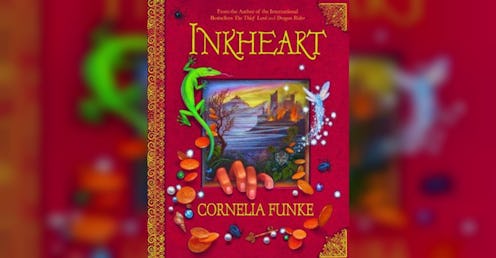Books
What Happened When I Read 'Inkheart' As An Adult

There's always a certain magic that can be found in the books you loved most as a child. Opening them back up can unleash a massive wave of nostalgia, and even if they aren't the kind of books we'd choose to read in adulthood, they often have the power to release all the same emotions we experienced when we read them as kids. Or at least, that's what I assumed was true. Honestly, when I dusted off my own favorite childhood book, Inkheart , for the first time in probably 10 years, I had no idea what to expect. When I was a kid, Cornelia Funke's novel was that story I could read a dozen times in a row without getting sick of it. But as an adult, would I be able to connect with a 12-year-old protagonist and feel the same way towards a plot that had captivated me so much a decade ago?
From the moment I opened Inkheart again, I had high hopes. Funke's writing style is downright enchanting. It's fitting that a book about characters coming alive right off the page is written in a way sucks you right into the story. I wasn't sure if that magical quality was just a heavy dose of nostalgia or if I would have felt it even if this had been my first time reading Inkheart, but I didn't care. The sensation of getting pulled so strongly into a story was one that I hadn't felt in quite a while.
I soon realized that my love for the characters in this book hadn't changed a bit since I'd read it last, but the way I loved them definitely had. I was eleven or twelve the first time I read through Inkheart, so at the time, twelve-12-year-old Meggie was someone I felt really connected to.
She was hard-headed, brave, and utterly obsessed with books. Now, I still saw my younger self in Meggie, but I related much more to her father, Mo. As a kid, I'd seen him as a kind, but overprotective father who could probably stand to let Meggie make more of her own decisions. Now, even though I don't have kids of my own or even much of a maternal instinct, I can recognize that Meggie was literally a child and that Mo would have been a lousy dad if he'd let her alone to take all the risks she wanted to. I feel the same urge as he did to protect my loved ones and handle huge problems on my own rather than putting others in harm's way, and I found myself agreeing with more of his decisions than Meggie's. You really realize how old you've gotten when you start siding with the parents instead of the kids in your favorite books and movies.
Another character I found myself feeling differently for was Dustfinger. I've always been a sucker for the "tortured hero" type in books (helloooo, Sirius Black), so it wasn't too much of a surprise when I developed a huge book crush on this out-of-place fire-eater when I first read Inkheart. Now that I'm no longer a preteen, it wasn't quite as weird to fantasize about reading him out of the book myself so we could make beautiful fire-taming babies together, but this time around, I was also able to see his less attractive qualities. Dustfinger might have a good heart and a lot of swoon-worthy angst, but he's also extremely self-serving and ignores his own conscience to get what he wants. Maybe real-life dating has simply made me bitter, but now, I realize that a real Dustfinger would be more winter-fling material than husband material.
One thing that stayed the same throughout the years, though, was Inkheart's ability to make me feel a whole range of emotions with less than 600 pages. It's rare that you find a book that makes your heart flutter, soar, and sink with such intensity, but this one definitely had that impact on me even after all these years. It took me back to a time in my life when I was too old to believe in magic and fairy tales, but still young enough to retain a bit of hope that they might become real somehow. As a kid, I turned to my fictional friends when real life became too much to bear, and I often daydreamed about what it might be like if they escaped the confines of their pages and ran into me on the street. Inkheart became the closest thing to such an experience I'd ever get... and in the process, it showed me that it might not be the dream come true I would have hoped for.
My perception of Inkheart might have changed over the past ten years, but my feelings for it have stayed the same. The characters have retained the special place they stole in my heart so long ago, and now that I've fallen in love with it all over again, I have no doubt that I'll be re-reading it more frequently. I may be an adult now, but this story doesn't lose its effect just because the reader is a few years outside its target audience.
If you've spent a few years without reading your favorite childhood book, I highly recommend revisiting it. Not only will it offer a temporary escape from adulthood, but it will also show you how much you've grown as a person. Just as we will always harbor a special love for our best childhood friends even as we grow apart with age, our most beloved books that we read as kids tend to place a hold on our hearts that we will probably never be able to shake off. And even if we could, why would we want to?
Images: Scholastic; Giphy (3)